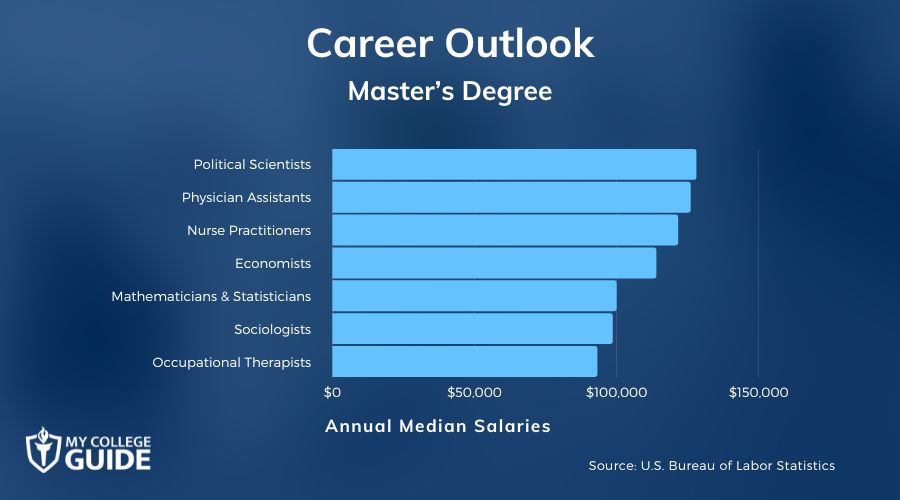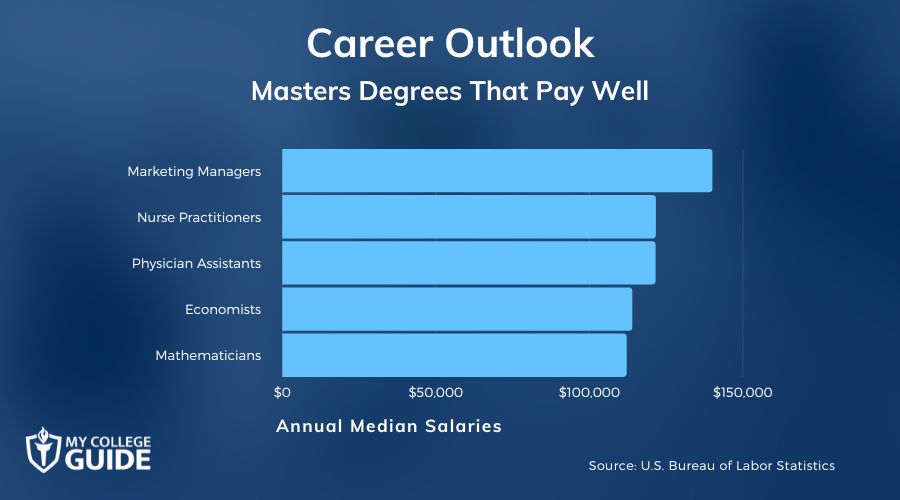Is a masters degree worth it? For many, earning a master’s degree is definitely worth it!

Earning a master’s degree can help you get ahead in your career. It may help you get a promotion or increase your salary potential. It can also give you a chance to delve deeper into interests you are passionate about.
Editorial Listing ShortCode:
Is a Masters Degree Worth It?

Yes, a masters degree is worth it for many students at various points in their careers and education. New graduates just completing their undergraduate degrees and experienced professionals returning to school may find a master’s degree program to be a rewarding experience.
There are numerous potential benefits to getting a master’s degree, including career advancement, increased earning potential, and additional job security. Earning a master’s may also expand the career opportunities available to you. Some careers require a master’s degree. Earning a master’s can be worth it if it’s required for the specific job you want to pursue.
While some industries are growing faster than others, earning a master’s may allow you to pursue more lucrative careers that are in higher demand. Pursuing online graduate degrees may also be worth it if you want to narrow your field of focus and develop a specialty in a particular area.
Editorial Listing ShortCode:
A master’s degree in a given area can also help set you apart from the competition when applying for jobs. You may also increase your networking opportunities by connecting with others in your field as you earn your degree.
While it’s important to weigh the pros and cons when deciding on master’s degrees that are worth it, earning a master’s degree is an important step toward success for many students.
Why Get an Online Graduate Degree?

If you’ve read this far, you are likely asking yourself, “Should I get a master’s degree?” If so, there are a number of things you’ll have to consider before deciding. Earning a degree is a big commitment that can potentially provide many benefits.
There are many reasons people pursue online graduate degrees. Some of these include:
- Increased earning potential: While specific salaries vary due to several factors, on average, earning a master’s degree can increase earning potential. According to the BLS, the median weekly earnings for those with a master’s degree is $1,661, compared to $1,432 for those with only bachelor’s degrees. That’s nearly $12K more a year!
- Improve job prospects: A graduate degree can help open many doors professionally, helping you take on new roles or move into new positions. More employers are seeking professionals with graduate-level education to fill important positions in their companies.
- Allow for a career change: After many years in a career field, some people start to feel stuck in a rut. You may long for a career that is more personally rewarding, provides long-term stability, or has more opportunities for growth. Many programs will allow you to pursue a graduate degree whether your bachelor’s degree is related or not, so you may use this opportunity to make a major life change and get started in a whole new field!
- Keep skills current and relevant: Pursuing masters programs online can help ensure that your skills are up-to-date and relevant to your position. If your career field is a rapidly changing one, such as technology, education, medical, or government fields, a master’s program may be extra beneficial in helping you learn new developments in your field.
- Increase credibility: A graduate-level degree is not just an investment of time and money, but of effort too. Completing the program and earning your degree means you have gone above and beyond to learn about your field and have demonstrated a mastery of a certain subject matter and skill set. To employers and colleagues, your degree can help serve as proof that you are a qualified expert in your field.
- Meet requirements of profession or advanced academic program: Some careers require master’s degrees for even entry-level positions. These fields may also require some additional certification or licensure that can only be acquired after completing a master’s degree program. Other professions require doctoral or professional degrees and a master’s degree may be a required stepping stone to move on to your next level of education.
There are a number of reasons that people pursue a master’s degree, but whatever your reason, an online graduate degree program can give you the opportunity to delve deeper into your field of study.
How to Decide Whether a Master’s Degree Is Right for You
Deciding to pursue a master’s degree is a big commitment, and it can be a tough decision to know whether it’s the right fit for you.
Editorial Listing ShortCode:
If you are still deciding, it may be helpful to consider these five reasons why earning a master’s degree may be right for you.
1. You have a clear motivation.

While everyone has their own reasons for getting a master’s, the most important ones for you are your own. Whether you want to move up in your career, earn more money and financial security, increase your job security, or gain additional knowledge, having a clear purpose and goal can help you stay motivated.
2. You have the time to commit to it.
In addition to the financial commitment, pursuing a master’s degree will require a significant commitment of your time and energy.
While some program formats allow you to take courses on your schedule, you will still need the time to do the work. Many working professionals with families and other commitments pursue online graduate degrees. Having or developing strong organization and time management skills is also key.
3. You want to expand your career opportunities.
Some careers require a master’s degree before you can work in those roles, while in other careers a master’s can help set you apart from competition seeking the same job.
If you are looking to advance in your current field or expand your opportunities beyond what is currently available to you, a master’s degree may help.
4. You can increase your earning potential.

While earning a master’s degree is not a guarantee of increasing your salary, many careers available to graduates of master’s programs do tend to pay higher salaries. Many higher-level business, management, healthcare, finance, and education positions require advanced degrees and offer higher salaries.
It can be helpful to research salaries in your field and ensure that your potential salary increase will provide a return on investment in your degree.
5. You want to specialize in a specific area.
Many master’s degree programs offer concentrations or specializations in focused areas you typically can’t find in undergraduate degree programs. For example, graduates with a bachelor’s in computer science may specialize in digital forensic science in their master’s degree program, which can help them become highly specialized in that area.
If there is an area you want to specialize in, earning a master’s may offer that chance. If any of these reasons resonate with you, then looking into graduate programs online may be the next step for you.
5 Things You Can Do with a Master’s Degree
As you explore options for online graduate degrees, you will find a wide range of fields and career paths you can pursue with a master’s degree.
Listed below are career paths you may pursue after completing a master’s program.
1. Nurse Practitioner

Nurse practitioners are experienced registered nurses who serve in various roles, including as educators, administrators, and researchers. Many nurse practitioners focus on treating a specific population, including pediatric, geriatric, and psychiatric health specialties.
Editorial Listing ShortCode:
Nurse practitioners work in numerous healthcare settings, including hospitals, primary care clinics, emergency rooms, and private practices.
2. Business Administrator

Graduates of online graduate programs in business can find opportunities in a wide range of fields, making this a potentially versatile and valuable master’s degree field.
Many graduates find opportunities to use their business and management skills in marketing, sales, finance, and risk analysis. Graduates may also use their skills to go into business for themselves or serve as business consultants.
3. Political Scientist

Political scientists study, research, and analyze all facets of political systems. They frequently conduct in-depth research and analyze the data to help make political predictions, evaluate the effects of policies, and test political theories.
A political science degree may be useful in other fields as well, including education, public policy, political campaigning, and market research.
4. Occupational Therapist

Occupational therapists help individuals with physical injuries or disabilities by developing individual improvement plans for them and helping them work through them. After assessing an individual’s needs, these therapists develop and work with clients on specific activities that can help them achieve wellness and independence.
Occupational therapists work in a variety of settings, including hospitals, nursing home facilities, and home health services.
5. Clinical Psychologist

Clinical psychologists work with patients on various issues to help them improve their overall mental health. Many clinical psychologists interview and assess patients to develop individual treatment plans for them.
Some psychologists focus on specialties, including neuropsychology or health psychology. These are just some of the careers that may be pursued with a master’s degree. Masters degree programs can help you pursue a new career or advance in your current career.
Master’s Degree Alternatives

If you decide that pursuing graduate programs online is not the right fit for you, you may wish to consider some of these alternatives to master’s programs.
- Certificates: Completing a certificate program can be a quicker way to gain a foundation in a specific area and demonstrate your credibility.
- On-the-job training: Many jobs provide and accept on-the-job training as a qualification to advance your career.
- Certifications: Some industries, like information technology, highly value certifications that demonstrate your qualifications in a specific area.
In addition to the above, online courses are available in almost every field that you can use to increase your skills and knowledge without completing a full master’s degree.
Master’s Degree Careers & Salaries

Many people attend online graduate programs to increase their earning potential and expand their career opportunities.
According to the Bureau of Labor Statistics, these are ten careers that typically require a master’s level education along with their average salaries.
| Careers | Annual Median Salaries |
| Political Scientists | $128,020 |
| Physician Assistants | $126,010 |
| Nurse Practitioners | $121,610 |
| Economists | $113,940 |
| Mathematicians and Statisticians | $99,960 |
| Sociologists | $98,590 |
| Occupational Therapists | $93,180 |
| Speech-Language Pathologists | $84,140 |
| Urban and Regional Planners | $79,540 |
| School and Career Counselors and Advisors | $60,140 |
These are just some of the careers that may be pursued with a master’s degree. Earning a master’s degree can help you advance in your own career and increase your salary potentially or even pursue an entirely new career.
Specific salaries are determined by a number of factors, including your education, experience, employer, and location.
What Is a Masters Degree?

A master’s degree is a graduate-level degree that demonstrates students have completed advanced study in a specific area. The requirements vary by master’s degree program, with some requiring students to complete a thesis to earn their degree.
Editorial Listing ShortCode:
Master’s degrees can be earned in almost any area of study, with students ranging from new graduates with bachelor’s degrees to experienced professionals. Earning a master’s degree can provide numerous potential benefits, including additional skills and knowledge, career advancement, and increased earning potential.
What Is the Average Cost of a Masters Degree?

The cost of a master’s degree will vary based on numerous factors, but it typically costs between $400 to $1,500 per credit hour to pursue a master’s degree.
You may be able to reduce your tuition if you are eligible for tuition breaks offered through the school or your employer. There are also other program costs to consider in addition to tuition, including materials, technology fees, library fees, and more.
Is Getting a Masters Degree Hard?

The difficulty of earning a master’s degree varies from person to person. Your skills, interests, experience, prior education, and motivation, among other things, can determine how hard it is for you to earn a masters degree. Other factors that can affect the degree of difficulty include your course schedule, other commitments, including work and family, and the program requirements.
If your program requires a thesis, you’ll need to complete more research and writing than in a non-thesis program, which may be more difficult for some students than others. Your course schedule can also impact the difficulty. Taking courses full-time on top of work and life commitments is often harder than taking courses part-time, even if you finish sooner.
How Long Does It Take to Get a Master’s Degree Online?

A number of factors, including your course schedule and the program’s requirements, will determine how long it takes to complete an online master’s degree.
Editorial Listing ShortCode:
A 36 credit hour program with no thesis requirement can potentially be completed in 1 year of full-time study, including summer courses. If your program requires a thesis or if you’re taking courses part-time, it may take longer than 1 year to complete
What Are Some of the Jobs That Require a Master’s Degree?

As previously mentioned, there are some careers that require master’s degrees for even entry-level positions, and some of these require further certification or licensure that can only be pursued after earning a master’s.
These are some of the careers that require master’s degrees:
- Therapists
- Nurse practitioners
- Education administrators
- Counselors
Other careers require doctoral or professional degrees, and typically a master’s degree is required to enter into those degree programs. Careers that typically require doctoral or professional degrees include:
- Judges
- Lawyers
- Surgeons
- Dentists
When deciding on the career you want to pursue, it is important to consider the level of education needed to obtain it.
Are There Masters Degrees That Pay Well?

When looking into masters degrees that are worth it, many students wonder what careers pay well and can be worth the investment for a master’s degree.
Based on data from the Bureau of Labor Statistics, here are some of the highest-paying careers graduates can pursue.
| Careers | Annual Median Salaries |
| Marketing Managers | $140,040 |
| Nurse Practitioners | $121,610 |
| Physician Assistants | $121,530 |
| Economists | $113,940 |
| Mathematicians | $112,110 |
Many of these careers are in demand and growing, with careers like marketing managers projected to grow 7% and physician assistants projected to grow 28% over the next ten years.
What Masters Degree Should I Get?

Deciding which masters degree you should get is an individual choice, but there are several factors that can help you decide:
- Interests: When deciding on a degree, it can help you stay motivated if you choose an area you are interested in that aligns with your long-term goals.
- Return on investment: Considering the long-term gain you want to achieve in terms of salary or career opportunities can help you ensure earning a master’s degree is worth the investment you will put into it.
- Job opportunities: Some industries and career fields are growing faster than others, so it’s worth researching where you might find the most job opportunities.
Considering what factors are most important to you can help you narrow down which degree to get.
Getting My Masters Degree Online

Earning a graduate degree can give you the chance to develop advanced skills in your field that will help you meet professional goals.
This may mean developing soft skills in areas like communication or management, or it may mean developing hard skills, such as understanding new advancements or technologies used in your field. Either way, earning an online graduate degree can help make you a more valuable and versatile employee.
An online master’s program can work around your existing commitments and allow you to work on furthering your education at a pace that works with your current lifestyle.
If you’re interested in pursuing your master’s degree online, you can start by researching accredited online master’s programs today!
